News & Announcements
- Details
- Written by Joshua Wachtel
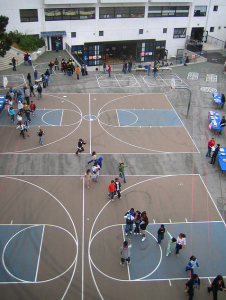 Photo by rick at Flickr Creative Commons, some rights reservedI've noticed a continuing theme involving a growing awareness of systemic prejudice in schools toward minority students. This manifests in higher rates of suspension and expulsion – which the Dignity in Schools Campaign describes with the phrase "School Pushout." This also shows up in increased use of metal detectors in minority communities - see this August 29, 2011 post. Restorative practices are being used to help reverse these trends.
Photo by rick at Flickr Creative Commons, some rights reservedI've noticed a continuing theme involving a growing awareness of systemic prejudice in schools toward minority students. This manifests in higher rates of suspension and expulsion – which the Dignity in Schools Campaign describes with the phrase "School Pushout." This also shows up in increased use of metal detectors in minority communities - see this August 29, 2011 post. Restorative practices are being used to help reverse these trends.
Amy Crawford reports in the San Francisco Examiner:
Black and Latino students are disciplined more often than white and Asian students, according to national data released Tuesday by the Department of Education’s Office for Civil Rights Tuesday.
- Details
- Written by Joshua Wachtel
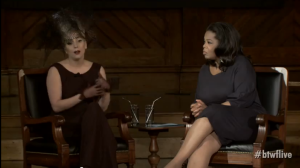 Lady Gaga and Oprah During the BTWF LaunchAs reported in a post last month, SaferSanerSchools Instructor Lee Rush was invited along with 80 other national leaders to Harvard University's Berkman Center for Internet and Society to help launch Lady Gaga's Born This Way Foundation (BTWF). Held on February 29th, the event was also sponsored by the MacArthur Foundation and drew high-profile names like Oprah Winfrey (who will broadcast part of the event on an upcoming television special), Deepak Chopra, and U.S. Secretary of Health and Human Services Kathleen Sebelius.
Lady Gaga and Oprah During the BTWF LaunchAs reported in a post last month, SaferSanerSchools Instructor Lee Rush was invited along with 80 other national leaders to Harvard University's Berkman Center for Internet and Society to help launch Lady Gaga's Born This Way Foundation (BTWF). Held on February 29th, the event was also sponsored by the MacArthur Foundation and drew high-profile names like Oprah Winfrey (who will broadcast part of the event on an upcoming television special), Deepak Chopra, and U.S. Secretary of Health and Human Services Kathleen Sebelius.
Now Rush reports:
The event was a way for the BTWF to gain “input from experts in the youth development field to help them formulate goals and priorities.” During the day, I met with twelve other professionals in the School Culture and Climate work-stream. A total of five other small groups met during the day focusing on issues such as research and evaluation, legalities, youth-driven initiatives, school-based and social media curriculum. At the end of the day, each work-stream reported out to the larger group results of their day's work and recommendations. The BTWF will be producing a paper encompassing the day's proceedings.
- Details
- Written by Joshua Wachtel
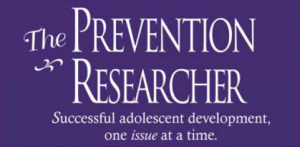 An upcoming issue of The Prevention Researcher will focus on Restorative Justice. They write:
An upcoming issue of The Prevention Researcher will focus on Restorative Justice. They write:
It has been our observation that many people are still unfamiliar with restorative justice or unsure what it means. Therefore, the goal of this issue is to introduce the topic, show what restorative justice looks likes in school and community environments, highlight the most recent research findings about its effectiveness (for the offender, victim, and community), and provide strategies for creating successful restorative justice programs and policies.
- Details
- Written by Joshua Wachtel
Here's a truly lovely video of restorative justice pioneer Mark Yantzi of Canada speaking about the inspiration for some of the first victim-offender meetings as a way of resolving a series of crimes - the notorious Elmira case. Yantzi is director of Community Justice Initiatives.
I love Yantzi saying at the very end of this 8-minute talk, "Crime is something that harms people, but if in the addressing of crime we can make things better for everyone, we've really been restorative in what we do."
- Details
- Written by Joshua Wachtel
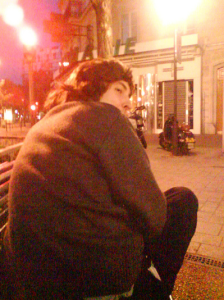 photo by AlecSchueler at Flickr Creative CommonsAn article from the Irish Times discusses the use of restorative justice as one solution to making an impact in terms of dealing with anti-social behavior, and criticizes the use of prisons and the negative impact they can have on offenders.
photo by AlecSchueler at Flickr Creative CommonsAn article from the Irish Times discusses the use of restorative justice as one solution to making an impact in terms of dealing with anti-social behavior, and criticizes the use of prisons and the negative impact they can have on offenders.
The lord mayor [of Dublin, Ireland said] there must be “consequences” for how anti-social behaviour affected the quality of life of communities.
“Prison can result in significant deterioration of behaviour resulting in worse outcomes for our communities,” he said.
- Details
- Written by Joshua Wachtel
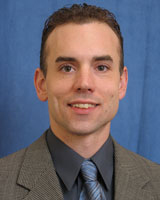 John Bailie, IIRP Director of Continuing Education
John Bailie, IIRP Director of Continuing Education
The use of restorative practices “is a highly effective response to bullying” in schools. So said John Bailie in his keynote address to a conference on bullying held at Southern Connecticut State University.
Restorative practices “builds a bullying-resistant school climate and teaches responses to bullying that hold children accountable while restoring social bonds,” said Bailie, Director of Continuing Education for the International Institute for Restorative Practices (IIRP), a graduate school in Bethlehem, PA.
Bailie spoke at SCSU’s 14th annual “Inside the Schoolhouse Door” Conference, attended by administrators and schoolteachers. The theme of this year’s conference was “Bullying: The Clinical Response.”
- Details
- Written by Joshua Wachtel
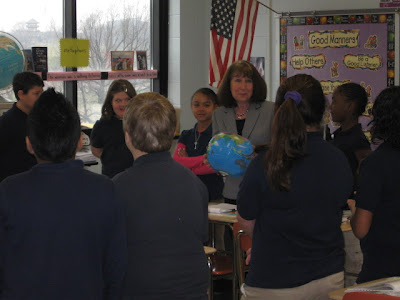 The Baltimore Curriculum Project writes on their news blog:
The Baltimore Curriculum Project writes on their news blog:
Thank you to Hampstead Hill Academy and the International Institute for Restorative Practices (IIRP) for an inspiring introduction to Restorative Practices this morning for over 40 Baltimore City Schools principals and teachers! Attendees visited classrooms and participated in restorative circles.
IIRP professional development trainer Beverly Manigo writes in:
The International Institute for Restorative Practices extends its appreciation to Hampstead Hill Academy and the principals, coordinators and directors from Baltimore City Public Schools who participated in the Open House. With the help of the Baltimore Curriculum Project and principals from both City Springs and Hampstead Hill Academy we opened the doors of one of their schools so that leaders in Baltimore City could see first hand the results of implementing Restorative Practices in a BCPS school. The turnout was great and principals, teachers and parents are excited about the work we are doing.
- Details
- Written by Joshua Wachtel
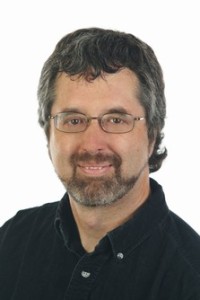 Here's a sneak peak, so to speak, of a forthcoming eForum article I've written about FaithCARE – Faith Communities Affirming Restorative Experience – a project of Shalem Mental Health Network in Ontario, Canada. This restorative practices program helps congregations heal from and resolve conflicts in their churches, and also proactively build community and use restorative practices to transform the way people in the church relate and do business.
Here's a sneak peak, so to speak, of a forthcoming eForum article I've written about FaithCARE – Faith Communities Affirming Restorative Experience – a project of Shalem Mental Health Network in Ontario, Canada. This restorative practices program helps congregations heal from and resolve conflicts in their churches, and also proactively build community and use restorative practices to transform the way people in the church relate and do business.
This podcast interview with Mark Vander Vennen, director of Shalem, begins around minute 1:45, and is a production of Crossroads Connection with host David Schuringa.
Note, too, that Bruce Schenk, of IIRP Canada, is a member of the FaithCARE team. He was involved in developing the use of restorative practices in his own congregation even before FaithCARE was founded and continues to do this work, which will be described in more detail in that forthcoming eForum I mentioned.
- Details
- Written by Joshua Wachtel
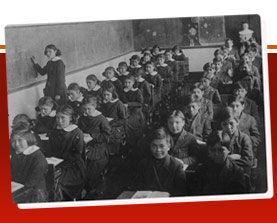 Aboriginal Children in a Canadian Residential SchoolFrom the 1870s to the 1990s, more than 150,000 First Nations, Métis and Inuit children were taken from their families and placed in government-funded, church-run Residential Schools. Aboriginal children were punished for speaking their own language or following traditional cultural practices and suffered emotional, physical and/or sexual abuse; some died. Their unresolved trauma, passed from generation to generation, has had a profoundly negative effect on the relationship between Aboriginal peoples and other Canadians.
Aboriginal Children in a Canadian Residential SchoolFrom the 1870s to the 1990s, more than 150,000 First Nations, Métis and Inuit children were taken from their families and placed in government-funded, church-run Residential Schools. Aboriginal children were punished for speaking their own language or following traditional cultural practices and suffered emotional, physical and/or sexual abuse; some died. Their unresolved trauma, passed from generation to generation, has had a profoundly negative effect on the relationship between Aboriginal peoples and other Canadians.
As explained at the The Truth and Reconciliation Commission of Canada web site (trc.ca) the TRC "has a mandate to learn the truth about what happened in the residential schools and to inform all Canadians about what happened in the schools. The Commission will document the truth of what happened by relying on records held by those who operated and funded the schools, testimony from officials of the institutions that operated the schools, and experiences reported by survivors, their families, communities and anyone personally affected by the residential school experience and its subsequent impacts."
For the Children Taken, for the Parent Left Behind
- Details
- Written by Frida Rundell
The second book in The Peacebuilding Compared Project, led by restorative justice pioneer John Braithwaite, addresses peacebuilding efforts in the long-beleaguered South Pacific island of Bougainville and answers questions about what works best to build peace. The book is reviewed and summarized by IIRP founding faculty member Frida Rundell.

Restorative Works Year in Review 2024 (PDF)
All our donors are acknowledged annually in Restorative Works.
